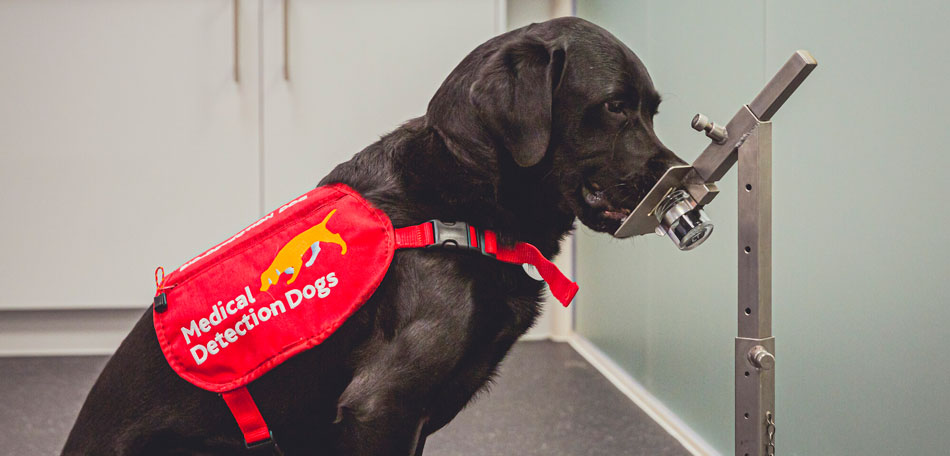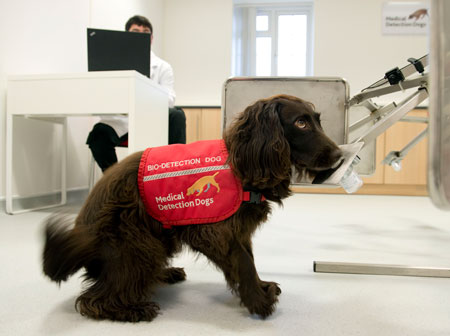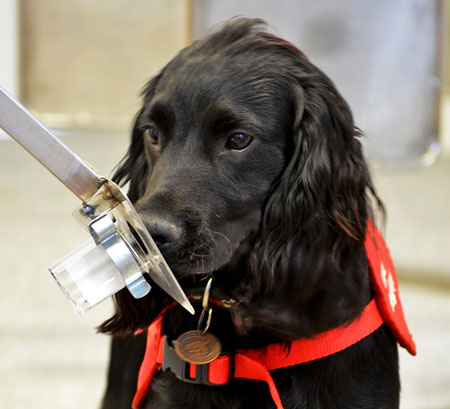Ground-breaking study shows that dogs can smell cancer in other dogs
The results of a study into whether cancer detection dogs can smell bladder cancer in other dogs’ urine suggests that this could be an effective new way to diagnose the disease in dogs.
Three dogs which had previously been trained to detect human bladder and prostate cancer, were trained by the charity, Medical Detection Dogs (MDD), to detect canine urothelial carcinoma (UC) of the bladder by the odour of urine.

Marlow: Neil Pollock
The results, published in Veterinary and Comparative Oncology, show that canine bladder cancer has a distinct smell, which specially trained dogs can rapidly and non-invasively detect with up to 90% sensitivity (the rate at which the dogs correctly identified positive samples) and up to 95% specificity (the rate at which the dogs correctly ignored negative samples).
The study included collaborators from Medical Detection Dogs, Davies Veterinary Specialists, University of Bristol and Royal Veterinary College and was funded by The Kennel Club Charitable Trust.
Around one in four dogs will develop cancer during their lifetime and UC is the most common bladder cancer in dogs, accounting for almost 2% of all reported canine cancers. The disease can resemble other urinary tract disorders such as UTIs and bladder stones and can be difficult to diagnose, as taking a urine sample via a needle (cystocentesis) is inadvisable because it may cause the tumour to seed. It’s similarity to other, more common conditions can also mean that vets can sometimes target infection when in fact the dog could have cancer.
For a definitive diagnosis, histopathology of a biopsy sample is needed which is invasive, costly, and increases the length of time required to obtain final results, which can delay the start of treatment.
The dogs, a chocolate Working Cocker Spaniel called Kizzy, a black Cocker Spaniel called Jobi and a black Labrador called Marlow, were trained to sniff urine samples attached to metal stands in the Medical Detection Dogs’ training room and show their indication behaviour in response only to positive (cancerous) samples. This could be a sit, stare or stand indication.

Kizzy: Mark large

Jobi: MDD
They were rewarded with food and play for both indicating positive target samples and for searching a negative line without an indication.
The urine collected was from leftovers from clinical patients at Davies Veterinary Specialists and healthy dogs belonging to Medical Detection Dogs and staff and volunteers of the charity.
Claire Guest, CEO, Co-Founder and Chief Scientific Officer at Medical Detection Dogs says: “We have proven many times that dogs can detect cancer in human samples so were confident that they would also be able to smell it in those from other canines.
“We are delighted that they were so successful at finding the odour of bladder cancer as it is a difficult disease to diagnose using traditional methods and unpleasant and intrusive for canine patients.
“When they do get diagnosed, the disease is often advanced so there is great potential value in a new, early, cheap, rapid and non-invasive diagnostic test which could lead to opportunities for earlier intervention than is possible at present.
“Dogs are way more than only man’s best friend.”
Mark Goodfellow, Head of Oncology at Davies Veterinary Specialists, says: “My colleagues and I at Davies Veterinary Specialists are delighted that this study, which was devised, planned and undertaken in partnership with Medical Detection Dogs, has been published. Showing that trained detection dogs can aid in the identification of this, often hidden disease, adds an extra tool in the diagnosis of urothelial cancer in dogs.”
Isabelle Desmas-Bazelle, who spearheaded the study at Davies Veterinary Specialists and is now a lecturer in oncology and Co-Head of Oncology at the Royal Veterinary College, says: “The dogs involved with the study demonstrated a sensitivity superior to cytology of a free catch sample and similar to the BRAF test. It suggests cancer cells have a unique odour pattern, possibly via secretion of volatile organic chemicals. This exciting research could lead to the development of an electronic nose as an additional diagnostic test for UC.”
Jennifer Millard, Chair of The Kennel Club Charitable Trust, says: “The Kennel Club Charitable Trust is delighted to have supported this exciting project. We applaud the efforts of Medical Detection Dogs, Davies Veterinary Specialists, University of Bristol and Royal Veterinary College for their ongoing valuable work and research, and of course Kizzy, Jobi and Marlow and other detection dogs whose special noses make such an incredible difference.”
The link to the paper is below:
https://veterinaryoncology.biomedcentral.com/articles/10.1186/s44356-024-00012-1
